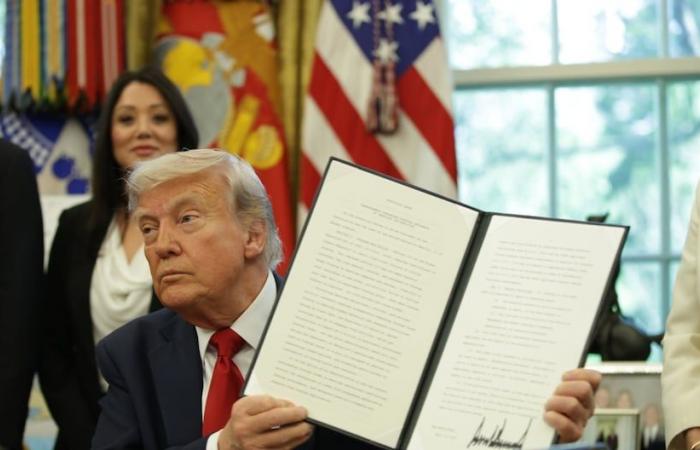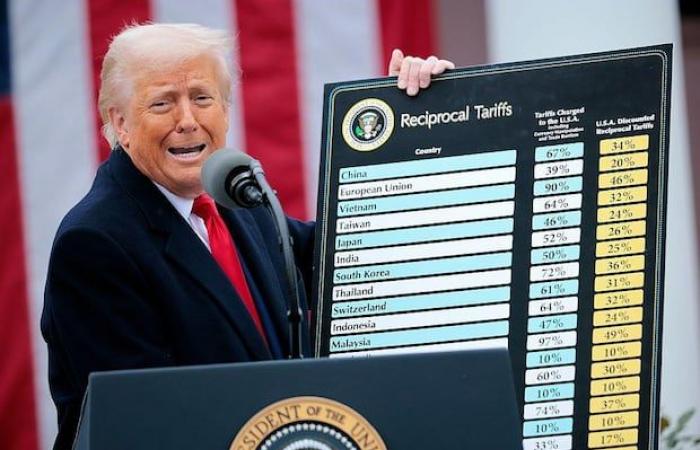President Trump is looking to impose his agenda in all areas: in the economy, commerce, immigration, foreign policy, education, health, armed forces, social policies and even the water pressure that reaches the White House to be able to wash “its beautiful hair”.
when he began his first term, Trump did not miss time and from the start he gave several executive orders to reverse many of the measures of his predecessor, Barack Obama. But this year, the storm of measures has far exceeded what happened in 2017.
“Trump learned from his first administration that, if he expects too much, he loses the ability to make sudden changes. Let’s not forget all the rotations of positions in 2017,” explains Dr. Nevena Trajkov, president of the Department of political Sciences of the University of Jacksonville, Florida.
“I think I am using the presidency’s powers. I feel that we have had successful 100 days”
Donald Trump
—–
Celebration rally
To commemorate his 100 days in office, Trump will hold a rally in Michigan, the first since he returned to the White House.
To do this, Macomb County will visit on Tuesday, located on the outskirts of Detroit, one of the key cities of the country’s automotive industry.
Michigan is a hinge and fundamental state in the elections, where Democrats and Republicans usually fight vote. Trump won there in 2016, lost in 2020 and won again in 2024.
These are some of its most sound and controversial measures that you have taken in these 100 days of government:
The tariff war and its open confrontation with China
It was no surprise that Trump was going to have China as his main objective by identifying him as his commercial and geopolitical adversary. In his first term, he had already outlined a kind of tariff war against the Asian giant, but nothing compared to what is happening today.
From the serve he faced his closest allies, Canada and Mexico, who was imposed by rates for not controlling their borders and allowing the entry of fentanyl to the United States. And in that bag also included China: 10% of additional tariffs. With the passing of the weeks the war was climbing: in March another 10% increased and China responded with 15% to US products.
Trump has hit China several times with tariffs this year.
Until arrived on April 2, the “day of Liberation”, when Trump announced taxes for almost all countries of the world “for not being fair to the United States”, under his strategy of bringing production back to his country. This decision shook the stock markets and, above all, put the United States Treasury Bond market at risk, which caused the president to back down a week later and leave his global tariff war in 90 days. Except with China, which imposed 145%rates, although it then put exceptions for certain technological products. The Beijing government has not blown up so far, and has responded with 125%, including the export of rare minerals, essential for semiconductors.
“The president has established an unprecedented agitation record in the history of the United States. But the decisions he made about the tariffs had the greatest scope of consequences, since the measure forced the world to reorganize completely in terms of economy and political alliances,” says Trajkov. “In essence, this has eroded any confidence in the United States, both political, especially among our allies, and in terms of capital investment,” he adds.
Illegal immigrants: public enemies
One of its main campaign promises has undoubtedly been the fight against illegal immigration. It was during his first mandate, but he did not achieve much more than extending the walls he had talked about. This time the matter has already taken another look.
-26 Decrees Donald Trump signed on January 20, on his first day at the White House. The first was the repeal of 78 executive orders of Joe Biden.
42% is approval by Donald Trump according to a last survey of Reuters/Ipsos of April 22.
In addition to declaring the national emergency on the southern border of the United States, he gave Carta Blanca to increase the raids and arrests against those suspected of being undocumented. Thus, the ICE (the Federal Immigration Agency) arrested about 33 thousand migrants in its first days of mandate, some of them with legal status and work permits. In addition, a series of protections for migrants of some nationalities, such as TPS, and several residence requests were paused.

Relatives of Venezuelan migrants deported from the United States to a prison of maximum security in El Salvador shout slogans during a vigil in front of the El Salvador Embassy in Caracas on April 2, 2025. (Photo by Juan Barreto / AFP)/ Juan Barreto
However, what has had the most impact has been the deportation of about 200 Venezuelans syndicated as members of the Aragua train to the Center for Confinement of Terrorism (CECOT), a maximum security prison in El Salvador, in an agreement that Trump arrived with President Nayib Bukele. Although the measure, invoked under the protection of a law of 1798, was revoked by a judicial ruling, the Supreme Court lifted the impediment, also showing the confrontation within the American justice apparatus around the Republican’s decisions.
Elon Musk and state expenses cut
The entry of billionaire Elon Musk to the White House has been one of the most controversial. As a special advisor to the Government Efficiency Department (Doge), his task has focused on cutting the expenses of the state apparatus in order to reduce costs, dismissing thousands of federal employees of various offices, and closing agencies such as USAID, or media such as Voice of America, which have been key to Washington in recent decades.
According to a “The New York Times” count, some 134 thousand people have been fired or renounced in advance, while the cutting of 145 thousand jobs is still planned. Some of the ceased have been replaced thanks to judicial orders, but nothing ensures that their positions are insured.

Musk directs the government efficiency department (Doge) and has become one of the most influential figures in the White House.
At first glance, it is not just bureaucrats that fill the state apparatus, but specialists and technicians in areas as sensitive as defense, energy, national security, meteorology (in a country that suffers annual hurricane attacks), education, health, health, public administration, among others.
For Trajkov, Trump was more controlled in his first mandate than now: “In her first administration she had a cabinet and a team that controlled her actions and avoided much of the chaos we see today. This time, Trump has surrounded himself with flatterers in her cabinet and has practically captured the institutions.”
The struggle against elite universities
Another aspect of Trump’s return has been his crusade against what is called the ‘Woke Culture’, the progressivism that is in the antipodes of his ultraconservative agenda. As part of that, elite universities – which are the most reputed liberal thought centers in the United States and the world – have been in their spotlight.
Under the argument that protests against Israeli bombings in Gaza allowed last year, the president accused the educational institutions of allowing anti -Semitism and threatened to cut the subsidies, which are crucial for their investigations. Among those affected are Columbia University -which accepted several of Washington’s demands -Yale, Upenn, Cornell and Harvard, the oldest and emblematic of the well -known Ivy League.
The Trump administration already frozen 2.2 billion dollars of financing for Harvard, which has not hesitated to respond with a lawsuit. Without a doubt in the coming weeks we will see more chapters of this legal battle, which has become staff for the president because the lawyer who has hired Harvard also works on the Trump organization.
The war in Ukraine and the bush to the allies
Before arriving at the White House, Trump said he would end the war in Ukraine in 24 hours. One hundred days later, the war has not ended and the negotiations do not yet come to fruition, but at least they have begun.
A few weeks after assuming his second term, he decided to get the relations with Russia out of the freezer and spoke with President Vladimir Putin for 90 minutes pointing out his goal of reaching an agreement, ignoring his European partners and cracking an alliance that seemed untouched since World War II.
Along the way, he received the Ukrainian President, Volodymyr Zelensky in the White House, which he publicly mistreated, he labeled “dictator” and almost blamed him for starting the war. However, frustration seems to be bored to Trump who, in an apparent change of posture, demanded that recent Russian bombings on kyiv.
It is still very soon to know if Trump will continue to chase peace or finally undertake the withdrawal and continue to focus on what interests him most: neutralize China.







